Science in Public is a science communication and public relations business based in Melbourne, with a core team of twelve staff and associates around Australia. That makes them Australia’s largest, non-government, science communication business.
They re helping the European Union Delegation and the French Embassy in Canberra to pull together a list of collaborative research involving Australia and EU countries.
Science in Public are interested in the full suite of research from basic science right through to research that’s close to a commercial application or has achieved a practical outcome here and in Europe.
The resulting list will be shared online. They’ll then write up a selection of the stories for two publications: a collection of EU and a collection of French collaborations. They’ll be published online and presented to a meeting of EU and Australian science agencies.
While collaborations with research powerhouses such as France and Germany are important, they would also like to show the full breadth of Europe’s ties with Australia by also including examples of some of the smaller member states leading the way with innovation and technology, such as Estonia and Malta.
For reference, the 28 current members of the EU are: Austria, Belgium, Bulgaria, Croatia, Cyprus, Czech Republic, Denmark, Estonia, Finland, France, Germany, Greece, Hungary, Ireland, Italy, Latvia, Lithuania, Luxembourg, Malta, Netherlands, Poland, Portugal, Romania, Slovakia, Slovenia, Spain, Sweden, and the United Kingdom.
So please let them know your most exciting European collaborations—including those with smaller nations—and they will compile them and share them with the Delegation.
Last year Science in Public asked for stories on Indonesian-Australian collaboration. You can see the result of that call at stories.scienceinpublic.com.au/Indonesia.
You can also see the collections of Japan and US stories at stories.scienceinpublic.com.au.
If you know of partnerships in a similar vein, please contact Niall on niall@scienceinpublic.com.au or his colleague Michael on michael@scienceinpublic.com.au with some information about the work and the details of the scientist they can talk to (if it’s not you).
Note: Science in Public are not asking you to write stories for them. They just need a headline or project name, the names of the organisations involved, a contact and a link for further information.

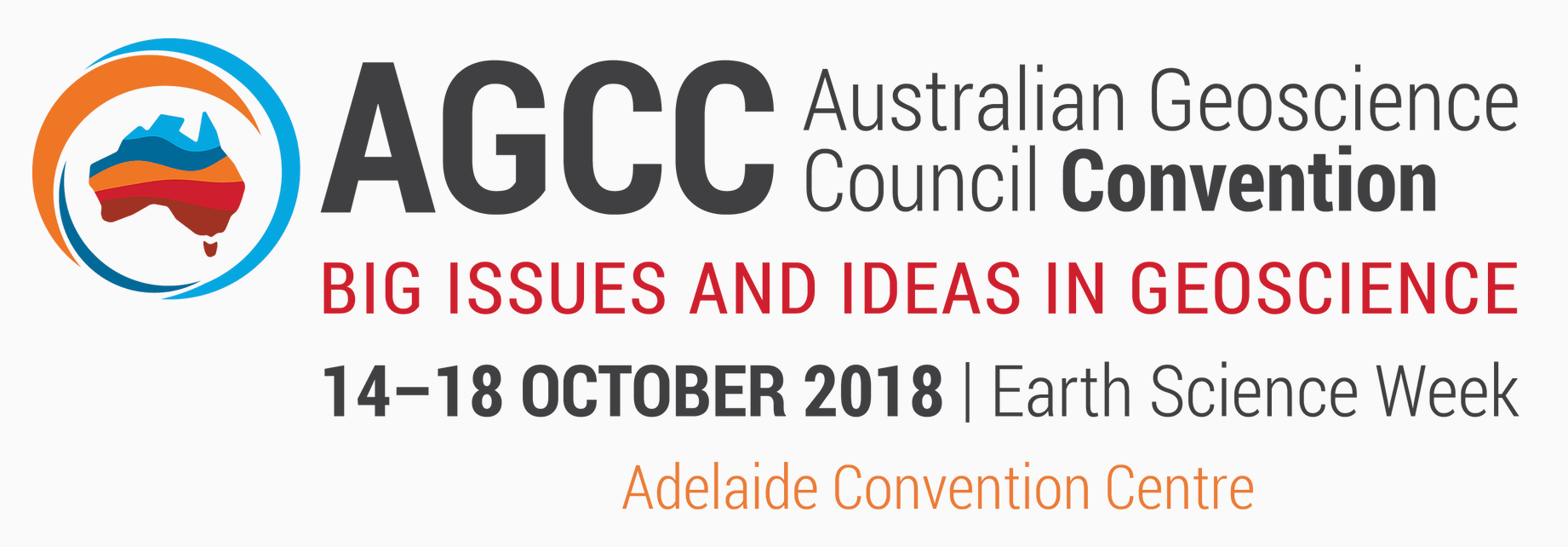
Only two weeks left for the largest Convention on Geoscience in the Asia Pacific Region since 2012. AGCC 2018’s highlights include:
Download the program and start planning your visit to Adelaide! Full and Day registrations are still available, please visit www.agcc.org.au/registration to view all registration options and inclusions and to register.
IMPORTANT DATES
Professional development workshops
Wednesday 3 October is the last day to register for AGCC 2018’s workshops. Visit www.agcc.org.au/workshops for detailed information on presenters, dates, costs and to register. These professional development workshops are open to delegates and non-delegates.
Publication bar
If you are interested in distributing items to delegates on the Convention’s Publication bar, email jess@ccm.com.au for approval before 5pm on Friday 28 September. This service is free of charge for Sponsors and Exhibitors. For non-sponsors and non-exhibitors the Publication bar will incur a cost of AU$800 plus GST.
Crèche facilities
Register on or before Monday 1 October to make use of the Crèche facility at the Adelaide Convention Centre, specially set up for AGCC 2018 with the support of NExUS. Arrangements and registrations at rhiannon@hesselgroup.com.au.
Special registration offer for Early Career Geoscientists and students
If you fit the criteria for Early Career Geoscientist status, you can pay just AU$765 for full Convention registration. That’s a saving of AU$235 on the current full member rate. The offer has been extended to Saturday 6 October. Click here for full details.
Students can register for only AU$250 if members of one of the AGC Member Organisations. If not a member, the registration cost is AU$500.? Opportunities to volunteer are open until Wednesday 3 October.
Standard registration
Standard registration for the Convention closes on Saturday 6 October. Please visit www.agcc.org.au/registration for more information and to register.
GeoEXPO’s bookings
Booth bookings for AGCC 2018 close at 5pm this Thursday 27 September. Don’t miss the opportunity to give extensive exposure to your brand to more than 1,000 industry leaders. Visit www.agcc.org.au/geoexpo for further information.
AGCC 2018 is proudly sponsored by Geoscience Australia (Patron sponsor) and Santos Limited (Major sponsor)
View all AGCC 2018 sponsors and partners

Malicious email
There appears to be a fraudulent email in circulation today from “IUGS – directory@iugs.org” with the subject line “IUGS Directory“. IUGS is the International Union of Geological Sciences and the inappropriate use of the IUGS address appears to be an attempt to target geoscientists.
Opening the email may not cause damage to your computer but we have been advised that the links and attachments are malicious.
The email may be deleted safely.
Andrew Waltho
20 September 2018
We are saddened to inform members that Emeritus Professor Colin Ward passed away in Sydney last night.
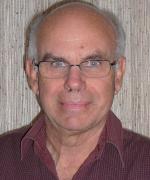
Professor Ward had a distinguished academic and research career in sedimentology and coal geology. He enthused and mentored many students through undergraduate and post-graduate teaching at University of New South Wales and University of Technology, Sydney. Professor Ward was an author of several, benchmark textbooks and numerous papers, particularly in the fields of coal geology and mineral matter in coal.
Professor Ward was a past AIG President and Councillor. He played a major role in developing AIG during its formative years.
Sincere condolences are extended by the Institute to Professor Ward’s family and friends.
Andrew Waltho
19 September 2018
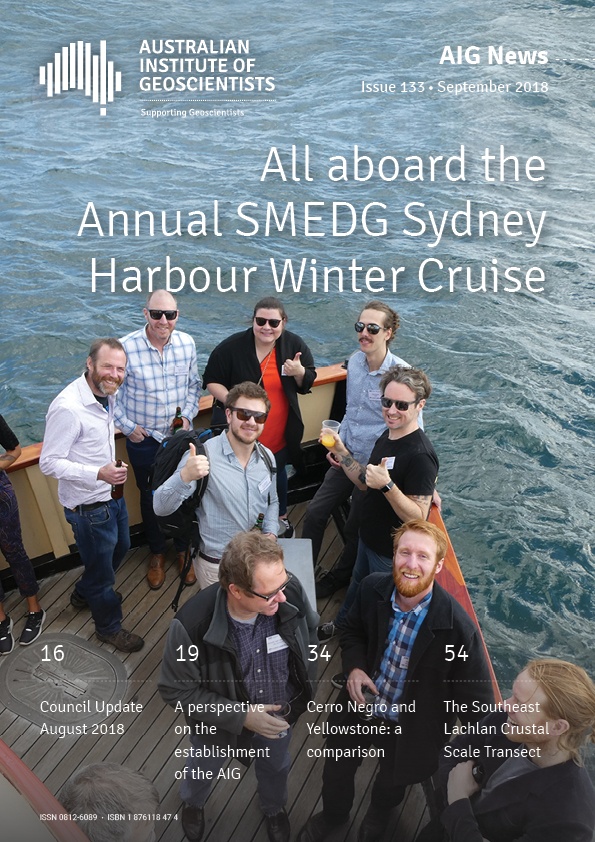 The latest edition of AIG News, the Australian Institute of Geoscientists member newsletter is now available in full colour and digital format and best of all FREE for all readers!
The latest edition of AIG News, the Australian Institute of Geoscientists member newsletter is now available in full colour and digital format and best of all FREE for all readers!
Now all AIG Members and Non Members can enjoy our FREE AIG Newsletter in digital format, including all previous editions. Please click here to see our archive of AIG News.
Download the latest copy of AIG News 133 below:
![]() For web: AIG News 133: Download as Single Pages PDF
For web: AIG News 133: Download as Single Pages PDF
![]() For web: AIG News 133: Download as Double Page Spread PDF
For web: AIG News 133: Download as Double Page Spread PDF
![]() For print: AIG News 133: Download as Single Pages PDF
For print: AIG News 133: Download as Single Pages PDF
![]() For print: AIG News 133: Download as Double Page Spread PDF
For print: AIG News 133: Download as Double Page Spread PDF
Inside this latest issue…
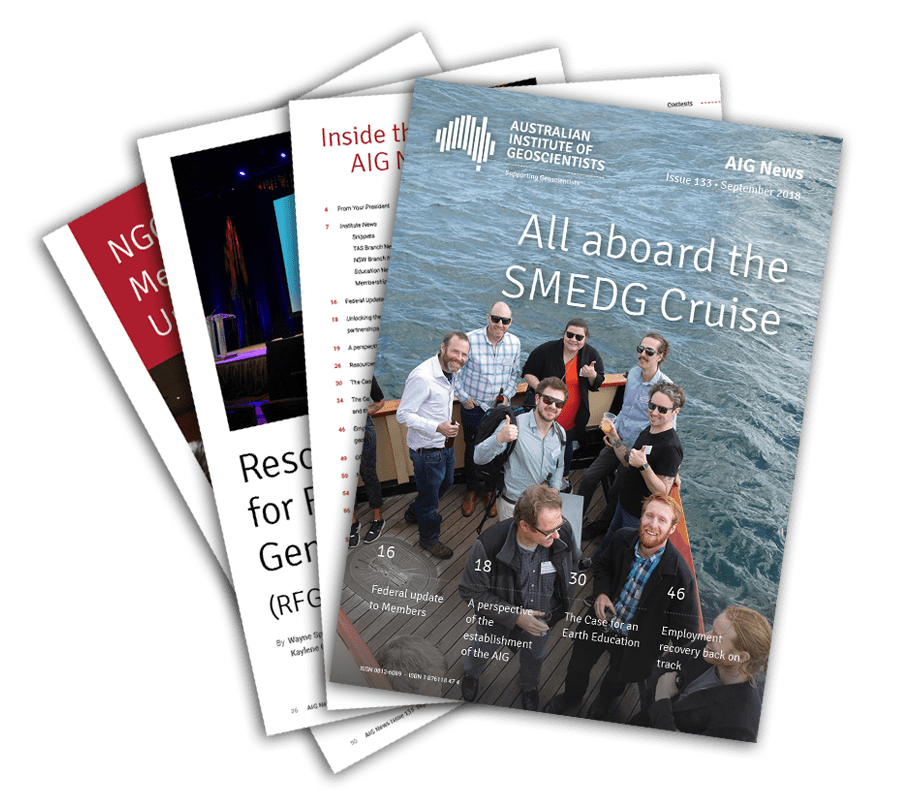 From Your President; Institute News; Education News; NSW Branch News; Membership Updates; Federal Update to Members; Unlocking the benefits of better ‘driller-geologist’ partnerships; A perspective of the establishment of the AIG; Resources for Future Generations (RFG 2018); The Case for an Earth Education; The Cerro Negro epithermal Au-Ag district, Patagonia, and the Yellowstone Plateau, USA: a comparison; Employment recovery back on track for Australian geoscientists – but no sign of a boom; OREAS Victoria Minerals Roundup; NGG & Mentoring Update; The Southeast Lachlan Crustal Scale Transect; Seequent and acQuire introduce Smart Refresh to Leapfrog Geo 4.3; Events Calendar, and more…
From Your President; Institute News; Education News; NSW Branch News; Membership Updates; Federal Update to Members; Unlocking the benefits of better ‘driller-geologist’ partnerships; A perspective of the establishment of the AIG; Resources for Future Generations (RFG 2018); The Case for an Earth Education; The Cerro Negro epithermal Au-Ag district, Patagonia, and the Yellowstone Plateau, USA: a comparison; Employment recovery back on track for Australian geoscientists – but no sign of a boom; OREAS Victoria Minerals Roundup; NGG & Mentoring Update; The Southeast Lachlan Crustal Scale Transect; Seequent and acQuire introduce Smart Refresh to Leapfrog Geo 4.3; Events Calendar, and more…
AIG News is optimised to be read with Adobe Reader. Versions are available for printing (with Adobe Reader version 4.1.3 or later) or either reading on-line or downloading for reading off-line with your laptop or tablet (with Adobe Reader version 6.1.5 or later). Both versions have been tested and are compatible with Apple Preview and iBooks for Mac and iPad users.
If you experience any difficulty accessing and reading AIG News using the Adobe Reader versions listed here technical support is available.
We hope that you enjoy the latest AIG News and welcome your feedback.

Exploration for mineral, energy and water resources is facing disruption – driven by more complex geological targets, new commodities and new technologies. CSIRO’s Digital Disruption in Exploration Symposium will focus on the implications of digital disruption in the mineral exploration sector. In particular, the growing volume of high quality data (big data) from disparate sources which present an enormous opportunity to develop new ways of collecting, interpreting and understanding geoscientific data.
The symposium, which will also have an associated pre-symposium tech tour and post-symposium workshop, will bring together a select group of international and Australian experts from industry, government agencies and academia, to examine the science drivers and disruptors that are changing the way we explore for mineral and energy resources. Sessions, with international keynote speakers, will include:
Opportunities exist for oral and poster presentations and we particularly encourage ECRs to participate through both presentations and interactive breakout discussions. Please email dde@csiro.au for more information and to lodge an expression of interest – indicating whether you would prefer an oral/poster presentation.
Visit the symposium web site to submit an abstract, program and registration information.
Part II. Continued Professional Development is expensive. Right?
Wrong. Continued pprofessional development (CPD) covers a broad spectrum of activities that contribute to both your development of new skills and refinement of existing ones. CPD always requires an investment of time but it does not need to be expensive or onerous in other ways.
CPD can be considered to be an investment, by you in your own career, and in your development as a professional by your employer. It can be both formal and informal and requires tracking and documenting the skills, knowledge and experience that you gain as you work, beyond any initial training. CPD records document what you experience, learn and then apply.
Some professions use the term ‘continuing professional develment‘ formally, and require a certain amount of development activity to be carried out and documented each year as a condition of maintaining your membership of, or registration with, a professional body, or a licence to operate in that field.
In other areas, CPD is used more informally. A commitment to learning and improving is, however, generally expected of anyone in a professional capacity.
There are no formal “licence to operate” provisions affecting geologists, generally, in Australia and New Zealand, although there are specific fields where government authorities require geoscientists to be members of a recognised professional association or institute. Requirements vary from state to state in Australia. The situation is very different in Canada, where professional registration is required to work in most provinces and legislation to mandate this is in place. Professional registration is also required in some U.S. states and in the European Union. AusIMM Members must have Chartered Professional status to act as Qualified Persons reporting exploration results, mineral resources and ore reserves to Canadian securities exchanges. This is not, however, required of AusIMM Fellows, or both AIG Members and Fellows. These arrangements are set in Canada and subject to regular review.
What is a profession?
A profession may be considered to be any career area for which you need a professional qualification. Traditionally, the professions included law, medicine (including dentistry and other allied professions), and accountancy. More recently, many other professions have emerged, including HR, marketing, sales and IT, all of which have recognised professional qualifications.
While CPD isn’t a requirement for geoscientists in Australia, it does demonstrate commitment to continually improving your skills, in addition to maintaining concepts of best practice through sharing learning with colleagues and peers.
Recording your development actions is essential. An important part of continuing professional development is being able to demonstrate it. It is important to keep a diary of all your development activities to be able to show how your skills and knowledge have developed over a period.
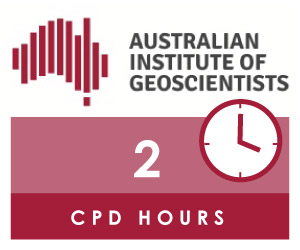
AIG organised and endorsed activities have specified CPD hours. You will have seen these logos in the AIG web site events calendar and email newsletters.
An investment in CPD is typically measured in CPD hours or CPD points, both of which are a combination of the time devoted to continued professional development and an activity weighting or multiplier. Multipliers reflect the effort and value associated with specific activities.
The AIG’s Registered Professional Geosceintist (RPGeo) programme specifies the following weightings for various CPD activities. Some examples of the weightings for different activities include:
| Activity | Weighting |
| Meeting, seminar and conference attendance, including webinars. | 1 |
| Formal postgraduate study, short course and workshop attendance (applied to lecture hours) | 2 |
| Distance learning – higher degree and postgraduate studies (applied to lecture hours) | 2 |
| “On the job” learning: e.g. mine visits (other than those associated with regular duties), working with consultants, undertaking company-sponsored research. | 1 |
| Preparation and presentation of materials for geoscience courses, conferences, seminars and symposia. | 2 |
| Participation in AIG and other professional society / institute committee work | 0.5 |
| Receiving mentoring (mentee) from experienced MAIG or FAIG | 1 |
| Providing mentoring to an early career or less experienced geoscientist | 0.5 |
Some activities are subject to additional restrictions, such as the proportion of total hours that may be provided by a single activity, to ensure that continued professional development completed by members has an element of diversity. There are also specified hours for some activities, such as 30 hours for publication of a paper in a peer-reviewed journal. A more detailed discussion of what constitutes CPD and relevant weightings is available here.
It’s not all about attending conferences and seminars. It is clear from the list above that there are a wide range of activities that contribute to professional development, readily accessible by all members. RPGeos are required to complete an average of 50 CPD hours per year, averaged over three years, which may sound onerous but is something that many members achieve without realising it, or doing anything out of the ordinary.
The key is ensuring that CPD activities are recorded.
What do you think? Is a requirement for all Graduates, Members and Fellows to undertake CPD, and in the process satisfying community expectations of what constitutes a professional, something that AIG should consider? Add your thoughts to this post or join the discussion on the AIG Linkedin Group.
Part I of this article series is available here.